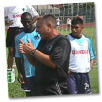Drills
To drill or not to drill, that is the question? During my coaching career I have seen the pendulum swing several times on this issue. I have seen periods where the trend was to break everything down into its smallest parts and then drill those parts, and hope that the drills would positively affect the whole action. I have also seen times where the emphasis was on the whole action with a minimum of drill work. Today, from my perspective, it appears we are in another drill era. That is fine as long as it is not carried too far. The drills must not become an end unto themselves; they must be a means to an end. Before designing drills make sure that you completely understand the whole action. Always relate the drill back to the whole action. Make sure the drill is not too far removed from the whole action. Try to distinguish similar and same. Think whole/part/whole. Mastery of a drill does not necessarily mean that the drill will automatically transfer to the whole. It has been my experience that too much drill work ultimately ends up with the whole action very segmented and choppy. I also think beginners should not be taught too many drills. They should get a feel for the whole and explore the whole movement before beginning to break it down to parts. I have seen this over and over in soccer. Young players are taught a plethora of fancy drills with no idea of how those drills flow into a game. They are also taught these drills before they are physically mature enough to get a good feel for the drills. Instead of drills it should be more playful and game like. Another example of drills rum amuck is sprint drills. You can teach someone a feel for running fast by playing task oriented games that make them feel different rhythms and stride patterns. Making it game like removes the skill from the cognitive domain and they learn by discovery. I know at this time you are probably thinking what about the mistakes they are making? Learn form mistakes. Contrast what feels good and what feels bad. Drills can have a place, but think about what is the ultimate objective. A seasoned performer that is working to perfect a small technical error will in all probability benefit more from drills than a rank beginner.
Finally apply this check list before you use a drill:
Why the drill?
What is the drill?
How is it executed?
When would it be used?
Does the athlete relate to it?
If you have good answers for all of these then go for it!


1 Comments:
Vern,
I have found that tag drills are great for a learning environment!
Definitely want to avoid becoming a Drill Instructor!
Post a Comment
<< Home